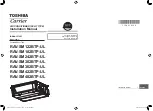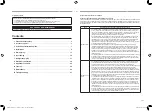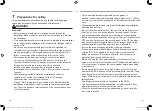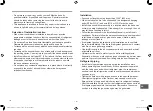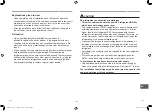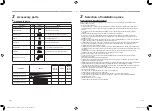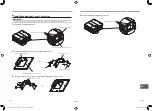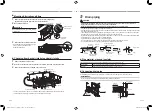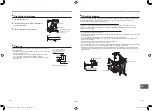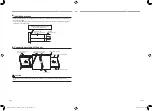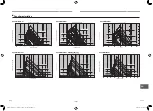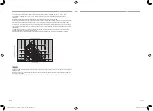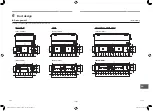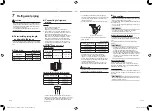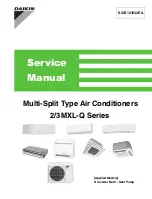
– 6 –
New refrigerant air conditioner installation
•
This air conditioner adopts the new HFC refrigerant (R410A)
which does not destroy ozone layer.
•
The characteristics of R410A refrigerant are easy to absorb water,
oxidizing membrane or oil, and its pressure is approx. 1.6 times
higher than that of refrigerant R22. Accompanied with the new
refrigerant, refrigerating oil has also been changed. Therefore, do
not let water, dust, former refrigerant, or refrigerating oil enter the
refrigerating cycle during installation work.
•
To prevent charging an incorrect refrigerant and refrigerating oil,
the sizes of connecting sections of charging port of the main unit
and installation tools are changed from those for the conventional
refrigerant.
•
Accordingly the exclusive tools are required for the new refrigerant
(R410A).
•
For connecting pipes, use new and clean piping designed for
R410A, and please care so that water or dust does not enter.
To disconnect the appliance from main power supply.
•
This appliance must be connected to the main power supply by
means of a switch with a contact separation of at least 0.1" (3 mm).
The installation fuse (all types can be used) must be used for the
power supply line of this conditioner.
CAUTION
Explanations given to user
•
Upon completion of the installation work, tell the user where the
circuit breaker is located. If the user does not know where the circuit
breaker is, he or she will not be able to turn it off in the event that
trouble has occurred in the air conditioner.
•
After the installation work, follow the Owner’s Manual to explain to
the customer how to use and maintain the unit.
Relocation
•
Only a qualified installer or qualified service person is
allowed to relocate the air conditioner. It is dangerous for the air
conditioner to be relocated by an unqualified individual since a fire,
electric shocks, injury, water leakage, noise and/or vibration may
result.
•
When carrying out the pump-down work shut down the compressor
before disconnecting the refrigerant pipe.Disconnecting the
refrigerant pipe with the service valve left open and the compressor
still operating will cause air or other gas to be sucked in, raising the
pressure inside the refrigeration cycle to an abnormally high level,
and possibly resulting in rupture, injury or other trouble.
EN
11-EN
12-EN
1128950138-00_S01_297x210_96p_S_p70_220212.indd 7
3/23/2022 8:10:09 AM

